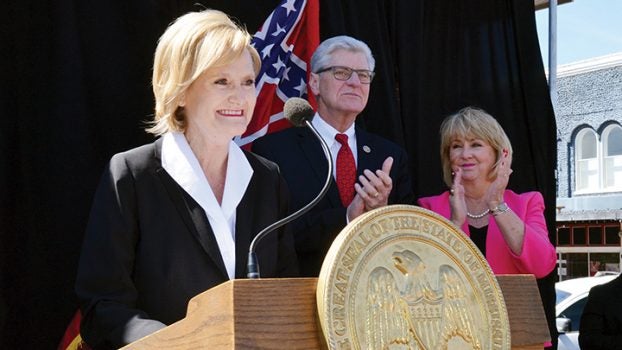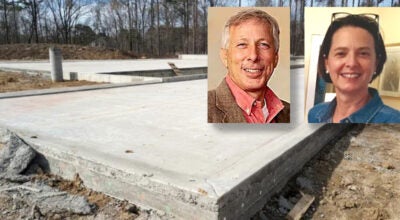Analysis: Four Mississippi congressional delegates say they know better than judges, state officials
Published 8:08 am Sunday, January 10, 2021
BY BOBBY HARRISON
MISSISSIPPI TODAY
This is an opinion and analysis article from Mississippi Today
Four of the six members of Mississippi’s congressional delegation, by their votes this past week, were trying to usurp the authority of state and local officials and the courts to conduct and oversee elections.
The four — U.S. Sen. Cindy Hyde-Smith and Reps. Trent Kelly, Michael Guest and Steven Palazzo — said they know better than the state and local officials and better than the judiciary, including better than the U.S. Supreme Court, how elections for president should be conducted.
Their disregard for the U.S. court system is notable since Hyde-Smith and others campaigned for re-election last year on how great it was that the judiciary had been populated by appointees of President Donald Trump, including three of his appointees to the Supreme Court. Now that it comes to the issue of the presidential election, they are ignoring the rulings of those judges.
During a chaotic and dramatic Wednesday afternoon and early Thursday morning at the nation’s Capitol, a group of minority Republican lawmakers, including the four Mississippians, challenged the presidential election results from Arizona and Pennsylvania. The original plan was to challenge the results in other states — all lost by President Donald Trump — but the challengers apparently got cold feet after Trump supporters attacked the Capitol that day, causing widespread destruction and death and temporarily halting what is normally a ceremonial event of accepting the election results from the 50 states and the District of Columbia.
There are two other members of Mississippi’s congressional delegation: Sen. Roger Wicker and Rep. Bennie Thompson. Like other congressional Democrats, Thompson voted to accept the state results that gave the presidential and vice presidential elections to Democrats Joe Biden and Kamala Harris.
Wicker, the state’s senior senator, said he was disappointed with the outcome of the election but could not substitute his judgment in overseeing elections for that of state and local officials and of the judiciary.
“Congress cannot — and should not — get into the business of deciding the results of our elections,” Wicker, a Tupelo resident, said in a statement. “Under the Constitution and federal law, Congress’s power is limited to counting electoral votes duly submitted by the states. Anything further would not be compatible with our Constitution or the conservative principles of limited government that I have sworn to defend.
“I also fear any attempt by Congress to overturn state election results would empower national Democrats to hasten the end of the Electoral College, which preserves a voice for smaller states like Mississippi in our national elections. Without the Electoral College, large, liberal states like New York and California would likely determine the direction of our republic to its detriment.”
In a statement, Guest said he voted to challenge the electors from Arizona and Pennsylvania because of changes to the election process in those states that were not approved by their legislatures.
“The United States Constitution gives state legislatures the exclusive jurisdiction to determine how elections will be conducted, commonly referred to as the Electors Clause. Simply put, these states failed to conduct elections that followed the requirements set up by their state legislatures and outlined in our Constitution,” Guest said.
Those issues highlighted by Guest had been brought before the judiciary in literally dozens of lawsuits and rejected.
If Guest and the other challengers had prevailed, the votes of literally millions of Americans would have been thrown out. For instance, one of the issues cited by the objectors that affected the most voters occurred in Pennsylvania where the Republican-controlled Legislature in October 2019 before the COVID-19 pandemic hit approved a bill to allow no excuse mail-in voting.
After the election was completed in November and it became clear President Trump had lost, his supporters filed a lawsuit saying the ballots of those Pennsylvanians who voted early by mail should be discarded because a change in the state Constitution was needed to enact early voting by mail.
That was not the opinion of Republican Pennsylvania legislators at the time they approved the bill, and it was not the opinion of the judiciary. And a question that should be considered: Would it have been fair to throw out the ballots of 2.5 million Pennsylvanians who voted in good faith through a system their elected officials offered to them?
Guest, Kelly and Wicker are all attorneys. With all due respect to Wicker, Kelly and Guest have more recent courtroom experience. Until their relatively recent elections to the U.S. House, they both served as district attorneys — Kelly in northeast Mississippi and Guest in central Mississippi.
As DAs, they routinely argued before members of the judiciary and accepted their decision as final at some point in the process
Perhaps they were tired of doing that and saw the presidential election as an opportunity to ignore the rulings of judges.
This story is published with permission from Mississippi Today. Click here for link to original story.
More News





